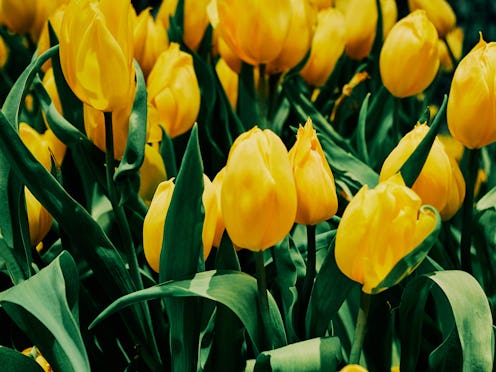
For many people, spring is a magical time full of blooming flowers, soft breezes, and trips to the park. For others, the very same can sound like an absolute nightmare. That's because, if you suffer from springtime allergy symptoms, there's really nothing nice about fresh blooms or going outside.
In fact, spring isn't a nice time for the approximately 58 million Americans who suffer from allergies, also commonly known as hay fever, according to WebMD. That's a heck of a lot of people sniffling and sneezing and suffering their way through what should be a lovely time of year.
So how could something as innocent as a flower ruin so many people's lives? The answer is: our immune system, and its total hatred of all things pollen. According to WebMD, "When pollen grains get into the nose of someone who’s allergic, they send the immune system into overdrive. The immune system, mistakenly seeing the pollen as foreign invaders, releases antibodies — substances that normally identify and attack bacteria, viruses, and other illness-causing organisms. The antibodies attack the allergens, which leads to the release of chemicals called histamines into the blood." When that happens, cue the long list of allergy symptoms, which include a runny nose, itchy eyes, and sneezing.
If that sounds like your life, then here are some ways to control your springtime allergies, and hopefully prevent them before they even start.
1. Wash Your Hair At Night
We don't really think about it, but hair acts like a giant net, blowing in the wind all day and catching pollen, dander, and dust as it goes. This is especially the case if you're a gel or mousse fan, noted an article on Health.com, as these products can trap allergens even more. So always wash your hair before bed, lest you smear your face in that pollen-y mess whilst you sleep.
2. Have A Relaxing Soak In The Tub
You never need an excuse to take a bath. But a long, hot soak may be in order, especially since new research is showing a connection between stress and allergies. According to Health.com, one study showed that seasonal allergy sufferers had a more extreme allergy reaction the day after performing a stressful task, such as giving a speech. That's because stress raises cortisol levels in the body, which can lead to a stronger allergic response. So go soak away — or partake in any other type of relaxing activity — and enjoy your allergy-free, stress-free life.
3. Cover Up When You Go Outside
If you have allergies, then please resist the temptation to parade around outside, especially during peak allergy hours at noon. But if you must, take some measures to cover up. I'm talking about wearing a hat and sunglasses to protect your eyes from pollen. And, maybe even a face mask, as suggested by Stephanie Booth on WebMD.com. I know, a face mask isn't exactly the sexiest fashion statement anyone's ever made. However, if you're truly sick, it might just be worth it.
4. Get A Doormat
Many people are in the good habit of taking their shoes off at the front door. The rest of us stomp through our apartments, tracking in all sorts of pollen and allergens as we go. (This is totally me.)
To prevent turning your apartment into a biohazard, start taking your shoes off at the door, or at least consider getting a door mat to catch some of the dirt. Look for a synthetic one, since natural mats tend to break down, attract mold, and make everything worse, according to an article on RD.com. Your apartment will be cleaner, and our sinuses will thank you.
5. Carry Around Eye Drops
We all know eyedrops can help cover up any number of "sins," but they can also help wash debris and pollen out of your eyes. This is a total godsend when they're red and itchy and driving you crazy. As Kate Mayer Robinson noted on WebMD.com, "[Eyedrops] work fast — about 15 to 20 minutes — when your eyes are itchy and watery. And they may prevent symptoms, too."
6. Take Your Allergy Meds Before You Need Them
The best way to prevent allergies is to take preemptive measures before symptoms start. That means pumping yourself full of allergy meds ASAP; as in well before you start sneezing and suffering. "This is usually about one week before the season begins, so that the medicine is already in your system by the time you need it," Booth noted.
7. Spring Clean Your Bedroom
There's something nice about spring cleaning and getting yourself ready for a new season. I personally love organizing all my spring clothes, finally putting away the sweaters I'm sick of seeing, and doing a good deep apartment clean. That latter part also helps with allergies, which is a nice bonus for my efforts.
According to RD.com, a good spring clean is all about getting rid of that dust, which you should look for in unlikely places, such as on top of the ceiling fan. Get into all those nooks and crannies and sweep up dust with a damp cloth to prevent tossing it into the air. When you're done, your apartment will be a safe haven from the pollen-ridden world.
8. Spring Clean Your Sinuses
When allergens find their way into your nose, they cause that dreaded histamine response. So, obviously you should do your best to keep sinuses clean. As Sara Schwartz noted on HuffingtonPost.com, keeping your nasal passages clean is important for people who get headaches and stuffiness. Using a Neti pot, or some other sinus irrigation system, can help by diluting and rinsing away pollen and molds that have lodged themselves deep inside your face. It's kinda gross, but it works.
Don't let allergies ruin all the glory and wonder that is spring. With just a few simple measures, you can help prevent them before they even start.
Images: Jakraphan Inchukul/Moment/Getty Images; Giphy (8)